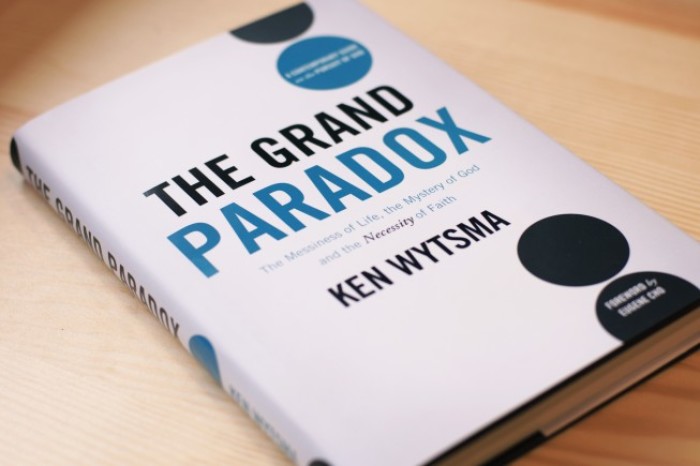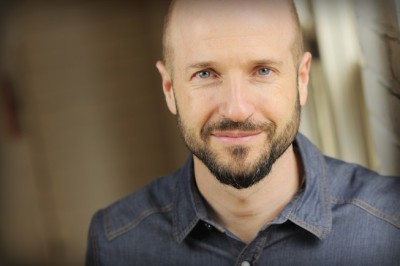Christian Faith Is Mysterious, Messy and Full of Paradoxes, Ken Wytsma Says (Book Interview)

Following Christ is not about finding comfort or personal well-being; rather, life is messy, God is mysterious, and faith lies in the tension of that paradox, Ken Wytsma, founder of the The Justice Conference, argues in his new book, The Grand Paradox: The Messiness of Life, the Mystery of God and the Necessity of Faith.

In an interview with The Christian Post, Wytsma explains that The Grand Paradox is sort of a part two to Pursuing Justice (2013). While Pursuing Justice was motivated by his desire to teach about the often misunderstood or neglected theme of justice, a central theme throughout scripture, his new book aims to touch "the deep parts of our soul," he said, by clarifying God's character and will for our lives.
When Wytsma writes about "God's will," though, he is not writing about a specific calling, as that phrase is often expressed (usually in terms of vocation). Rather, he writes about what it means to live a life of faith amid all the hardships, disappointments and ups-and-downs life has to offer.
"At the center of the idea of 'God's will for my life' lies a subtle self-deception that 'life is really about me,'" he wrote in chapter 8, "Personal Calling and Mission." "... We want to write God into our story; but God prefers writing us into His. ... Instead of asking what God's will is for my life, I should be asking how I can serve God's will with my life."
In the forward, Pastor Eugene Cho of Quest Church in Seattle compares the book's message to the story of Jesus and his disciples encountering a storm on the Sea of Galilee (Mark 4:35-41). The story began, Cho reminded, with Jesus choosing to take his disciples toward the storm — a contradiction for anyone who believes that following Jesus means a life of comfort and safety.
"Ken reminds us in The Grand Paradox that doubt is not the enemy of faith and that mystery is not to be feared," Cho wrote. "Even doubt and mystery — like the fierce winds and chaotic sea — submit to Christ."
Each of the book's 16 chapters are short and easy to consume in a single sitting. A small group discussion guide and other church resources are available on Wytsma's website, kenwytsma.com. There is even a "parent guide" for teaching kids about the "grand paradox."
Here is the full interview, conducted via email:
CP: Why did you want to write this book?
Wytsma: The Grand Paradox was an attempt to address the tension we feel in life when we realize life is messy (messier than we think it should be) and God is mysterious (less clear and forthright than we think he should be). That tension is the life of faith — the walk where we choose to obey and follow despite our lack of clarity, the presence of suffering or our experience of doubt and dark nights.
A side note, this book was also kind of a part two to Pursuing Justice. I discuss this in Chapter 5, but if we are going to give our lives away — show greater concern for others than for ourselves — the issue of faith and whether God will "catch me" becomes a very important one. If I'm looking out for others, who's looking out for me? My prayer has to be, "God, if I live this crazy counter-intuitive life of love and service, will you truly walk with me and be there for me?" The answer shows up in Habakkuk: the just will live by faith.
CP: In the history of the Church there have been times when Christians seemed to be more attuned to the mysteriousness of our faith, the Middle Ages come to mind, and it's certainly mentioned often in scripture. How did we arrive at the point where the Christian faith is treated like a how-to manual or 12-step program?
Wytsma: The American church, influenced by American culture, has a history of shading the meaning of faith so we come up with false notions that everything is about me … it's all individualized and ultimately is aimed at my well-being and comfort. Scripture, however, tells a different story. We were never promised exemption from difficulty or perfectly blessed lives simply because of our belief in God — rather, we're promised that God is good and following him is better despite the trials, despite the setbacks and despite the allure of sin and selfishness. Faith is the choice to believe that promise and walk forward in trust despite the uncertainties and fears that come our way.
12-step programs, self-help techniques and formulas can devolve to simply me finding utility in religion. There's no difference, however, between this and yoga, Buddhism, secular self-help or other contemporary ways men and women seek to experience peace or improve themselves. If God only exists to serve my improvement, he is minimized and becomes purely functional.
The beauty of the mystery of Christian faith was always that it posited God at the center of everything and turned all of our notions upside-down. What works in the Kingdom of God is actually paradoxical: die to live, give to gain, serve to be blessed, the weak are strong, etc.
I loved the exercise of tackling most of the deep questions we wrestle with regarding Christian faith and arriving with a God-centered and joy-filled answer: that faith, hope and love are possible even in the mess and in the mystery.
CP: Many of our readers probably know you best as the founder of The Justice Conference. You wrote that many of your friends are "burned out on doing good," or have "justice fatigue." How does that happen?
Wytsma: There's a temptation to try and fix the world or perform some heroic deed to permanently end injustice. This (very American) impulse is unsustainable. It either leads to burn-out when we don't see enough change coming from our sacrifice, or it leads to pessimism because we feel our efforts don't really make a difference.
I usually say two things to this. First, justice isn't about being heroic, but faithful. How I treat my spouse or respond to someone who cuts me off on the road is just as important as the relief worker trip I take to some foreign country. Justice is righteousness and a central part of what it means to be human and to grow into the image of Christ. As such, instead of a Herculean enterprise, it needs to be seen as a part of my discipleship and Christian obedience.
Secondly, we shouldn't assume we can't change the world just because we can't "fix" it. We pursue justice because we care and because God commands us to care for the vulnerable and oppressed. We don't do it for self-gratification or credit. We can't always eradicate evil or injustice in an arena, but that doesn't mean our efforts aren't meaningful or necessary in combating injustice.
If we begin with healthy expectations and move justice to a central place in our lives, we will avoid burnout — much like a marathon runner who paces herself rather than exploding in an unsustainable sprint from the starting line.



























